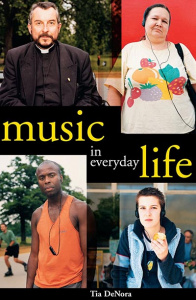Music in Everyday Life
 By Tia DeNora
By Tia DeNora
Review by Elsa (Music)
Music in Everyday Life by Tia DeNora initially appealed to me because music is such an integral part of my life – from my academic course, to practising instruments in my spare time, to listening to music as I’m relaxing. I wanted to appreciate the reasons behind my musical decisions and the depth of the processes at work. ‘Music in Everyday Life’ was one of the first musical academic books that I read, before applying to Oxford. It was a good place to start as it is not written in an intimidating style and assumes little prior knowledge of the subjects it discusses.
The premise of this book is interesting because instead of focusing on theoretical discussions of music theory or history, it applies musicology to aspects of life. It allowed me to see the music in my everyday activities and understand what affected my musical choices. For example, the music that I choose to listen to whilst exercising often has musical elements which make me more energised and motivated; the choice of listening to music at all is founded on the theories of distraction and disassociation from the body whilst exercising. Similarly, it was eye-opening to find that the background music in retail stores is often designed to affect consumer choices. The application of music that struck me the most, and that I was not expecting, was music’s applications in medicine. I was particularly fascinated by its uses in pain management and reducing stress. It was amazing to see the significant benefits that music can have on people that are suffering.
DeNora also covered the effects of music on a wider scale. She speaks of the organisational properties of music, particularly due to its affective or emotional power. The unconscious reactions that listening to a specific piece of music can provoke are often very similarly displayed within a large group of people – but what makes you think a piece of music is “relaxing” or “angry”? These themes link in with music’s role in expressing oneself and forming a self-identity; a person who loves classical music is usually given a different stereotyped character than somebody who prefers hip hop. Therefore, musical preferences can be used to create stereotypes within societies.
This book was a good foundation for my first year of studying music, as it showed me one way in which to put the theories being taught into practice. DeNora helped me to further my understanding of the psychological principles behind my every day actions, in relation to music. If you like to listen to music, I would recommend this book! It doesn’t require a significant amount of technical musical knowledge, and I found it very enlightening.
Music in Everyday Life by Tia DeNora
ISBN-10: 052162732X
ISBN-13: 978-0521627320
Try checking the availability of this book at your school or local library or explore second hand bookshops and websites. You may also wish to purchase from either Amazon or Blackwell’s.
